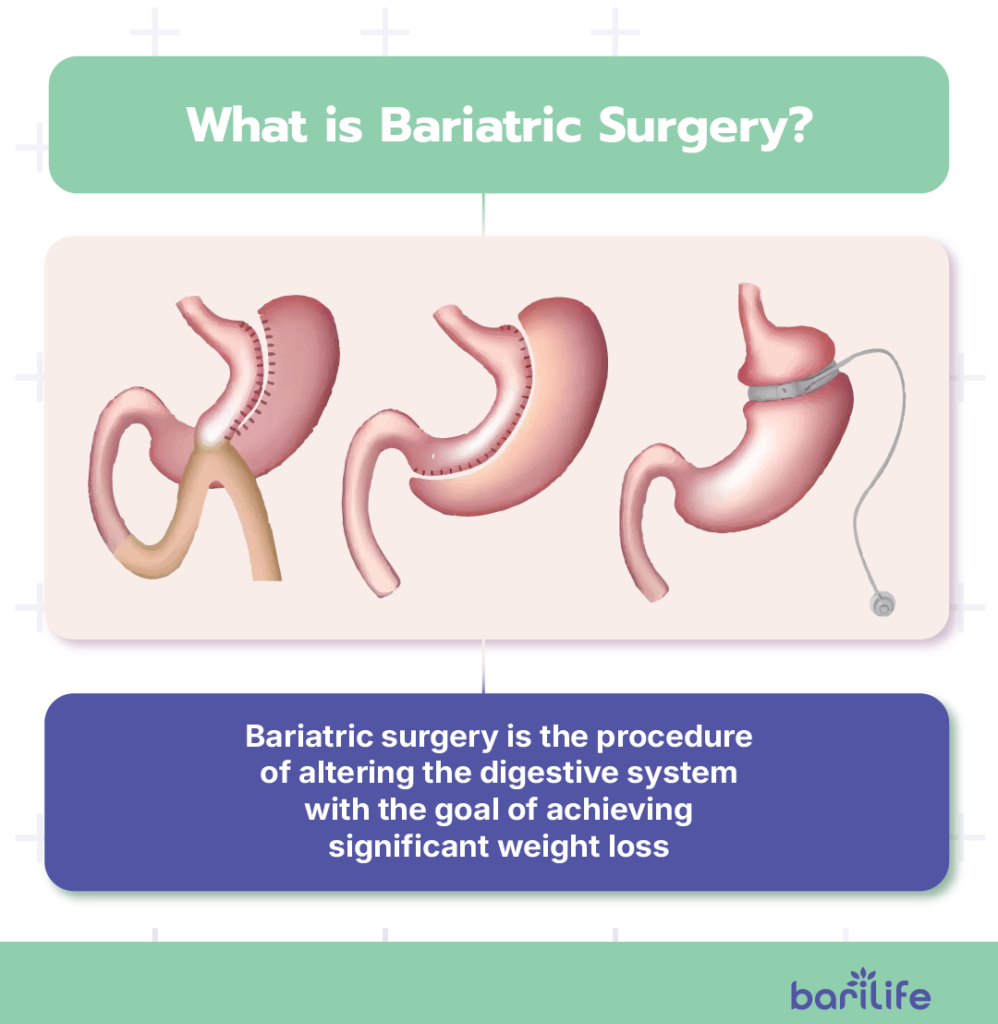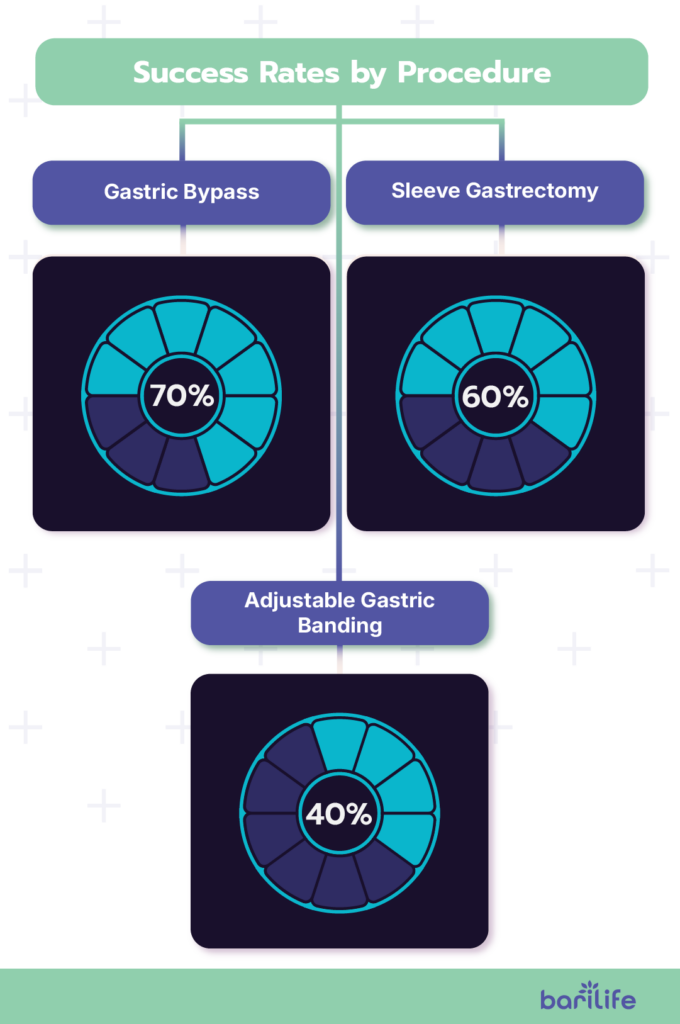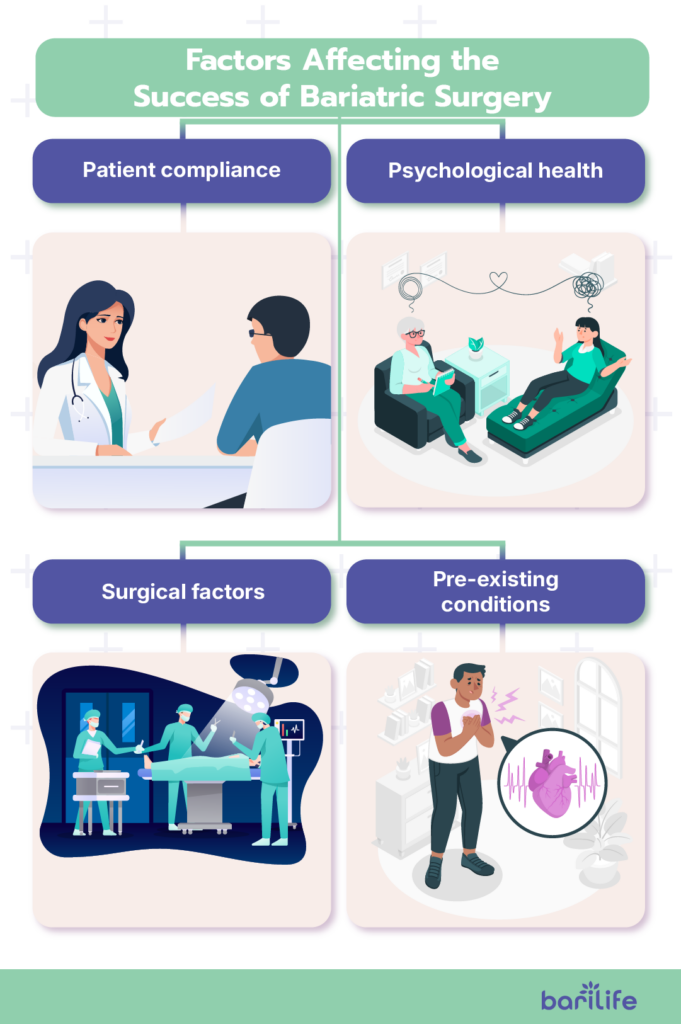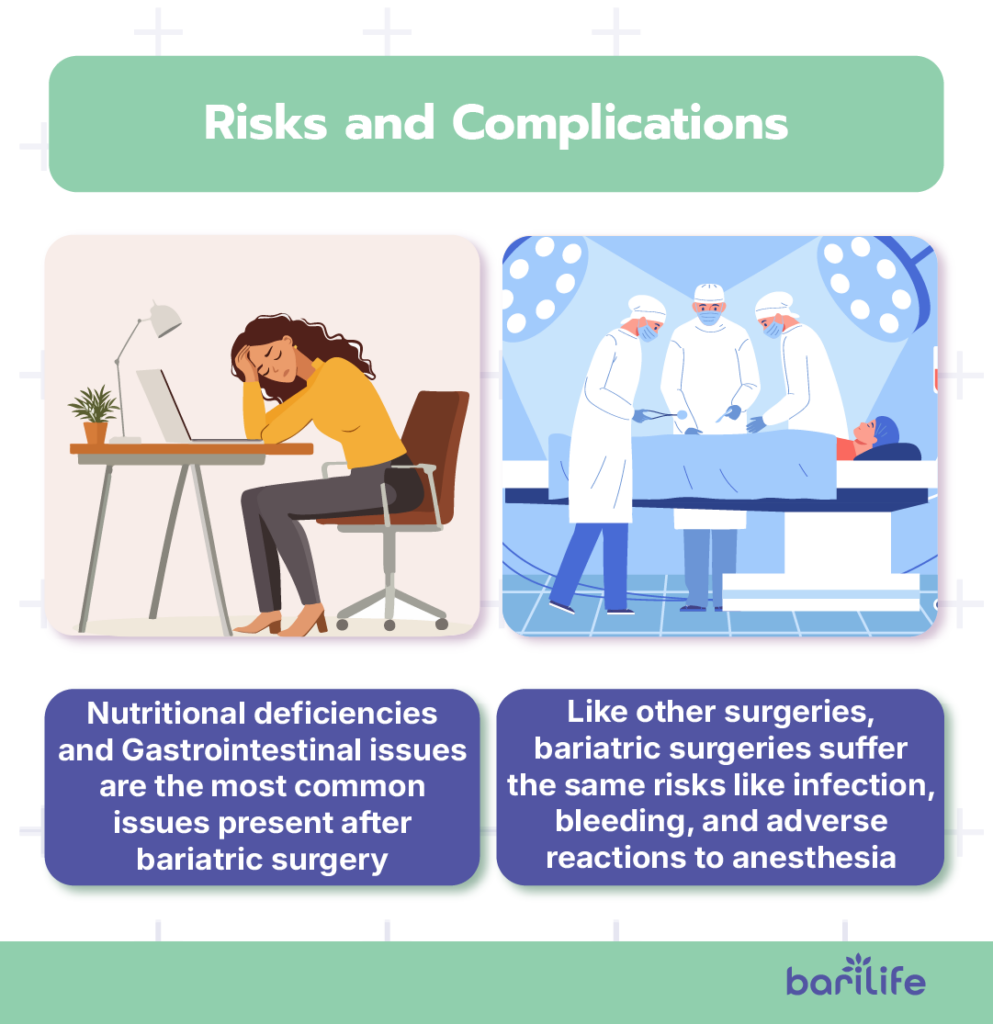The success rate of bariatric surgery depends on various factors, including the procedure type, your ability to adhere to dietary and lifestyle changes, and other individual elements.
Experts define a successful outcome as losing 50-70% of excess weight, 20-30% of the person’s initial weight, or reaching a body mass index (BMI) below 35 kg/m.
Research consistently shows that even modest weight loss of 5-10% can significantly improve health conditions related to obesity, such as type 2 diabetes, high blood pressure, and fatty liver disease, while also enhancing overall quality of life.
Read on to learn the long-term effectiveness of bariatric surgery, examine weight loss trends, and other influencing factors such as surgical technique, gender, and lifestyle behaviors.
Table of Contents
What is Bariatric Surgery?

Bariatric surgery refers to medical procedures designed to help you achieve significant weight loss by modifying the structure of the digestive system. How does bariatric surgery work? It typically involves reducing the stomach’s size or rerouting portions of the intestines to limit nutrient and calorie absorption.
Common bariatric procedures include:
- Gastric bypass: This procedure creates a small stomach pouch and reroutes a portion of the small intestine. It reduces both food intake and nutrient absorption, promoting rapid and substantial weight loss.
- Sleeve gastrectomy: This involves removing a significant portion of the stomach to create a smaller, sleeve-shaped stomach. It reduces the stomach’s size and limits hormones that trigger hunger.
- Adjustable gastric banding: A band is placed around the upper part of the stomach to form a small pouch. This restricts the amount of food that can be consumed to aid in weight loss.
The main goal of bariatric surgery is to help individuals with severe obesity achieve their health goals through weight loss. Significant weight loss can improve overall health, and reduce the risk of obesity-related conditions such as diabetes, hypertension, sleep apnea, and offer numerous benefits of bariatric surgery.
After surgery, many individuals rely on bariatric vitamins to maintain their nutritional health. Options like bariatric multivitamins or bariatric calcium chews ensure that your body gets essential nutrients despite reduced food intake.
How is the Success of Bariatric Surgery Measured?
Weight loss is one of the main measures of a successful bariatric surgery. However, experts measure several other aspects that contribute to overall improved health.
Here are some of the aspects experts look at when evaluating the success of bariatric surgery.
- Weight loss is measured as the percentage of excess or total body weight loss achieved over time.
- Health improvement includes resolving or improving obesity-related conditions such as type 2 diabetes, hypertension, and sleep apnea.
- Quality of life focuses on improvements in physical functioning, mental health, and overall well-being after surgery.
- Surgical outcomes evaluate the absence of complications, successful healing, and not needing a surgery revision.
For those wondering “Can you have bariatric surgery twice?”, the answer is yes, but revisional surgeries depend on the individual’s situation and potential complications.
Success Rates by Procedure

The effectiveness of bariatric surgery largely depends on the type of procedure performed.
Each method has unique success rates, weight loss outcomes, and potential challenges.
Below is a breakdown of the success rates for three common bariatric procedures based on recent studies.
Gastric Bypass
Gastric bypass surgery has very positive success rates for significant and sustained weight loss.
A study from 2020 shares some statistics.
Five years after the surgery, 89.1% of people lost more than 10 kg (22 lbs) of weight.
Within six months, the male’s BMI dropped from 43 kg/m² to 33.4 kg/m² and the female’s BMI from 43.8 kg/m² to 33.8 kg/m² within six months.
Additionally, the number of people with type 2 diabetes decreased from 36% to 14%.
Participants also reported improved physical activity. Before surgery, only 34% of the people participated in regular physical activity, whereas 64% of them kept up with consistent exercise after surgery.
Sleeve Gastrectomy
Sleeve gastrectomy is another effective bariatric procedure.
Long-term studies report that most people lose about 50% of their excess weight around five years after surgery.
Another positive is that 71% of patients experienced remission from type 2 diabetes within the first month after surgery.
However, challenges such as weight regain and recurrent acid reflux remain significant concerns.
These issues sometimes require a second operation. However, they are strongly influenced by factors like dietary habits, reduced physical activity, and hormonal changes.
Adjustable Gastric Banding
According to studies, adjustable gastric banding has the lowest success rate among bariatric surgeries.
Research indicates a high failure rate, causing many people to have to undergo additional procedures for complications such as:
- Band erosion
- Intolerance
- Band slippage
Only a small percentage of people achieve long-term weight loss maintenance making it a less favorable option compared to other procedures.
Factors Affecting the Success of Bariatric Surgery

Several factors have a significant impact on the success of bariatric surgery. Knowing these factors can help you make lifestyle decisions that support a successful outcome.
- Patient compliance: Success heavily depends on adhering to post-surgery guidelines. This includes following the dietary plan, engaging in regular physical activity, and attending follow-up appointments to monitor progress.
- Psychological health: Having a strong support system and stable emotions can help you maintain the necessary lifestyle changes. People who struggle with mental health issues may face challenges in adhering to new habits.
- Surgical factors: The type of bariatric procedure as well as the surgeon’s skill and experience, are crucial. A well-performed surgery tailored to your needs can lead to better outcomes and fewer complications.
- Pre-existing conditions: Health conditions such as type 2 diabetes or heart disease can affect recovery and weight loss outcomes. Managing these conditions before and after surgery is essential for maximizing success.
Importance of Diet and Exercise After Bariatric Surgery
Diet and exercise are pivotal in achieving and maintaining success after bariatric surgery.
Eating the right foods is essential for providing your body with the necessary nutrients and preventing complications such as nutrient deficiencies.
Many people need to take vitamin and mineral supplements to meet their nutritional needs after bariatric surgery. Working with a registered dietitian can be extremely helpful in learning how to meet your body’s nutritional needs while adhering to bariatric surgery guidelines.
Exercise is equally important. It helps you lose weight and maintain your weight loss, improves cardiovascular health, and enhances overall quality of life.
Risks and Complications
Like all surgeries and medical procedures, bariatric surgery has certain potential risks and complications.
Knowing what these are helps you make an informed decision and better prepare yourself for possible complications.

- Surgical risks: These include infection, bleeding, and adverse reactions to anesthesia, which are common risks associated with any surgical procedure.
- Nutritional deficiencies: Alterations made to the digestive system during bariatric surgery often lead to deficiencies in essential vitamins and minerals. You may need to take supplements to maintain proper nutrition.
- Gastrointestinal issues: It’s common to experience vomiting, diarrhea, or food intolerances as your bodies adjust to the changes in your digestive system.
- Long-term complications: Over time, some people develop gallstones, hernias, or require additional surgeries to address issues such as weight regain or procedural complications.
Conclusion
Success rates of bariatric surgeries vary by procedure and other factors. Gastric bypass and sleeve gastrectomy show the strongest outcomes in terms of weight loss and comorbidity resolution.
Adjustable gastric banding has lower success rates and higher complication risks.
Long-term success depends on complying with dietary and lifestyle changes, regular follow-ups, and addressing potential complications.
By understanding the benefits, risks, and factors influencing outcomes, you can make an informed decision and maximize the success of your bariatric surgery journey.
How Bari Life Can Help
Boost your recovery and set the stage for long-term success with Bari Life’s vitamins, supplements, and meal replacements.
Bari Life products are specifically designed to help you meet your nutritional needs, support healing, and maintain energy levels during recovery from bariatric surgery.
Don’t let nutrient deficiencies slow you down—trust Bari Life to help you stay on track and achieve your health goals.
Start your journey to a healthier you today!
If you want to learn more, why not check out these articles below:
- How Long Does Bariatric Surgery Take?
- Long Term Effects of Bariatric Surgery
- Is Bariatric Surgery Outpatient?
- When Was The First Bariatric Surgery Performed?
References
Banovic, M., et al. (2020). Five-Year Outcomes in Bariatric Surgery Patients. Medicina.




What are your tips and tricks to post-bariatric success?